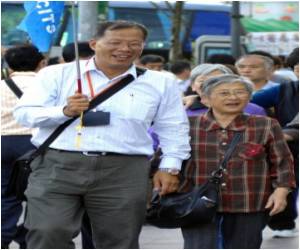A wave of civil awareness across Taiwan, Hong Kong and China is inspiring more documentary makers to unearth stories that otherwise would not be told, suggests a director.

Lee said the trend is strongest in Taiwan, where the public is increasingly wary of warming ties with China which still considers the self-ruling island part of its territory awaiting reunification.
"Almost all social movements in Taiwan [now] have some documentary filmmakers filming them," he said.
In one example earlier this year, the Taipei Documentary Filmmakers' Union shot "The Day of Uprising" as tens of thousands of students belonging to the Sunflower movement occupied Taiwan's legislature in protest at a cross-straits trade agreement with mainland China.
Lee, 45, said Taiwan's Sunflower and Hong Kong's Occupy Central civil movements were examples of a public actively questioning its leaders.
In Hong Kong public discontent has been growing over rising inequality, increased political interference and the perceived cosy relationship between the city's powerful business elite and Beijing.
Activists had their hopes for genuine democracy dashed after China announced last month that candidates for the city's next leader in 2017 would be vetted by a pro-Beijing committee and that only two or three people would be allowed to stand. The movement has since lost steam.
- Denied in China -
Lee won the Grand Prize and Best Documentary at this year's Taipei Film Festival for "Unveil the Truth II: State Apparatus", his sequel to "Unveil the Truth: Government Virus" (2013) which seeks to uncover alleged bureaucratic mishandling of avian flu breakouts on the island.
He is taking part in Hong Kong's annual Chinese Documentary Festival this month showcasing 44 films.
Among those from China include a look at urban encroachment on traditional farmlands and ways of life; a reflection on the bitter legacy of conflict on a small village in China's Xinjiang province and the impact of desertification in Gansu province.
The irony is that stringent censorship means mainland Chinese audiences are rarely -- if ever -- given the opportunity to watch such films.
The Chinese government last month shut down the annual Beijing Independent Film Festival, which had scheduled a number of documentaries for screening, including Lee's.
China's leaders under President Xi Jinping have taken aim at civil society, imposing greater censorship in what analysts call an effort to muffle dissent that is proving powerfully effective.
"Filmmakers are having a lot of difficulties there," said Tammy Cheung, a Hong Kong-based documentary film maker and co-founder of the Visible Records organisation, which stages the festival giving Chinese filmmakers the chance to show their work to a predominantly Chinese audience.
"They might take their films to international festivals but they rarely get the chance to show them to their own people," said Cheung. "They are still trying to have their voices heard."
- 'Giving people a voice' -
Hong Kong-based 32-year-old Jo Cheng, whose mournful "Via Dolorosa" is screening at the festival, trained her cameras on the plight of a Hong Kong street sleeper in a city whose gap between rich and poor is among the world's widest.
"I didn't really think of an audience when I started," she explained. "I was more concerned with learning how to tell a story. But documentaries provide a platform for difference communities to ask questions and find out answers."
Lee, who started out as a television producer, said cheaper digital filming equipment had "significantly brought down the threshold for making documentaries", meaning more were now being made.
Nevertheless director Cheng works various part-time jobs to fund her films and struggles to attract financial support due to limited prospects in terms of box office returns and audience.
"But documentaries and social media are giving more people a voice, and allowing more topics to be discussed," she said.
"I want to look at issues that are covered up, and too protected."
Lee added that when it came to China, getting subjects to go on record with an opinion was difficult due to worries over any potential consequences.
"But they must never forget one thing: over-tolerance will become servility; unchecked servility will make one forget the importance of freedom," said Lee.
Hong Kong's Chinese Documentary Festival runs until October 4.
Source-AFP
 MEDINDIA
MEDINDIA




 Email
Email




